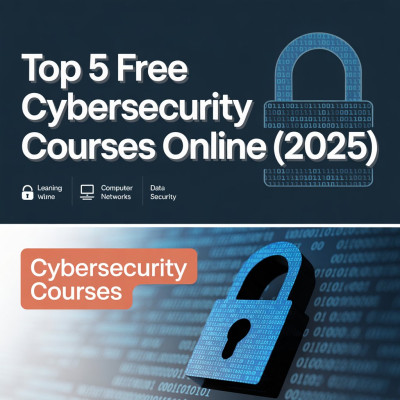
Precious Azuonwu
 free cybersecurity courses, cybersecurity certifications free
free cybersecurity courses, cybersecurity certifications free
 0 comment
0 comment
 18 Aug, 2025
18 Aug, 2025

The world is becoming more digital every day, and so are cyber threats. From ransomware attacks to phishing scams, organizations urgently need skilled cybersecurity professionals. ECR Academy has made online learning easier than ever to start your cybersecurity journey without spending a fortune.
1. Google Cybersecurity Professional Certificate (Coursera)
Google’s beginner-friendly course covers the fundamentals of cybersecurity, including network defense, threat detection, and risk management. It also comes with a certificate that employers recognize globally.
2. Introduction to Cybersecurity (Cisco Networking Academy)
Cisco offers a well-structured free course for absolute beginners. It focuses on cyber risks, data protection, and digital safety practices. Students also gain access to Cisco’s global learning community.
3. Cybersecurity for Beginners (Open University on FutureLearn)
Open University provides a simple but practical introduction to cybersecurity concepts like malware, cryptography, and password security. It’s designed for learners with zero IT background.
4. Cybersecurity Fundamentals (IBM SkillsBuild)
IBM SkillsBuild offers free, high-quality training with modules on cloud security, cyber hygiene, and identity protection. The platform also provides badges you can showcase on your LinkedIn profile.
5. Ethical Hacking Basics (Cybrary Free Courses)
For learners interested in hacking skills, Cybrary’s free modules introduce penetration testing, vulnerability assessment, and ethical hacking principles. It’s a great starting point before advancing to paid certifications like CEH.
Entry-Level Roles You Can Start With:
With free training and dedication, you can qualify for junior roles such as:
Free courses are a stepping stone to advanced certifications like CompTIA Security+, CEH (Certified Ethical Hacker), or CISSP. They provide the foundation you need before investing in more in-depth training.
When to Upgrade to Paid Programs
While free courses are excellent for building basics, they often lack advanced labs and mentorship. At some point, upgrading to a paid program will be necessary to access job-ready skills and deeper specialization.
Once you finish a free course, consider enrolling in a professional academy to sharpen your expertise. If you’re in Nigeria (or even learning remotely), ECR Academy is one of the best places to advance your cybersecurity career.
ECR Academy provides:
By starting with free courses and then joining ECR Academy, you’ll be well-prepared to land high-paying cybersecurity jobs in Nigeria and beyond.
Getting Started with Cybersecurity in 2025
Cybersecurity remains one of the most in-demand and highest-paying careers in 2025. Free online courses provide a great way to test the waters and build essential skills without risk. Start small, stay consistent, and when you’re ready, upgrade to advanced academies ECR Academy to maximize your career growth.
Ready to Launch Your Tech Career?
Whether you're starting or upgrading your tech skills, you can begin your learning journey with us today.
Review our courses with us at ECR Academy We provide the hands-on, project-focused training you need.
Build Comprehensive Digital Solutions with ECR Technology Services Limited Let us help you bring your brand, business, or idea online with professional digital solutions such as secure, responsive websites, robust mobile applications, high-impact digital marketing templates, and specialized Learning Management Systems (LMS).
Contact Us Today:
Phone Us: 08105568468
Visit Us: 51 Macaulay Street, Umuahia, Abia State
Mail Us: info@ecr-ts.com
Yes. They help beginners gain essential knowledge, provide career direction, and in some cases, certificates employers recognize.
The Google Cybersecurity Professional Certificate and Cisco Introduction to Cybersecurity are ideal starting points.
Free courses can prepare you for entry-level roles, but for mid-to-senior positions, advanced certifications or paid programs are often required.
Most courses take 4–12 weeks if you dedicate a few hours per week. Self-paced courses may be faster or slower depending on your schedule.
Yes, Google, Cisco, and IBM provide free or low-cost certificates that carry weight in the industry.
You’ll learn fundamental concepts such as network defense, threat detection, password management, and the basics of ethical hacking.
Yes, platforms like Cybrary offer free beginner-friendly ethical hacking content. However, advanced hacking skills require paid certifications.
Precious Azuonwu
0 comment